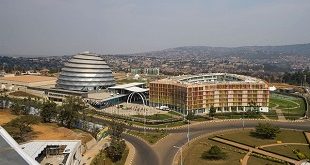
By Aloysious Kasoma
Born deformed and abandoned by the State and NGOs, a helpless woman dreams on
At 29 years, Veronica Namawejje has the usual dreams of womanhood; finding Mr. Right, marrying, and starting a family.
“I want a husband who will not cheat on me and bear children out of wedlock,” she says in her Luganda vernacular, “I can’t stand that.”
Although her dreams are nothing unusual, the odds of her attaining them are for one simple reason; she is physically disabled in an unusual way.
“She was born abnormal with the legs behind her back like a frog,” says her mother Annet Nakyanzi. “She could not sleep normally like others babies.”

During her childhood, Namawejje struggled to sit and at one year, when other children in her age bracket are making their first steps to walk, her flabby legs remained folded behind her back. At six, she still struggled to sit upright though she somehow managed to crawl.
Namawejje lives with her elderly parents, Francis Makumbi, 82, and Nakyanzi, 70. They live in a single room in Kawaala, in Rubaga Division of Kampala city and Namawejje has her own shelter on the side, which she calls home.
He mother still recalls how she struggled trying to straighten her daughter’s legs. “I used to tie them with sticks to make them straight but they couldn’t. I tried to go to Mulago (Referral hospital where Namawejje was born) countless times but all didn’t work so I gave up,” she says in Luganda.
Apart her head, chest and her hands, which are normally developed, the rest of her lower body organs are disabled.
But that has not stopped Namawejje, the last born of six children, from becoming a popular person in the Kasubi, Makerere Kikoni and Nakulabye area where she was born and has lived all her life. People know her because of her sociable and talkative behavior.
Latifah Nabbosa, a close friend, describes her as a person who is “full of hope.” Namawejje, who is said to be very religious, is a frequent churchgoer at Kawaala Revival Church.
“She uses hands to crawl allover Kasubi, Makerere Kikoni and Nakulabye and many people know her because she keeps telling them about God and inviting them to her Church,” says Nabbosa.
Her mother used to worry that her daughter’s movement while crawling on the ground could put her life in danger. However, she says she could not block her from what appears to be the source of her strength; interacting with people.
Namawejje’s dreams do not stop at finding a husband.
“I want to build my house; I am tired of this place,” she says, as she sits at the entrance of her tiny shelter.
She makes table clothes and weaves veils for sale but she wants to perfect her weaving skill and complement it with making crafts. She does not know how the inside of a classroom looks like, but prays for an opportunity when someone offers to teach her how to make handcrafts so that she can earn more money.
“I want to learn how to make crafts because with weaving I can take a month without getting a single sale,” she says.
No opportunities
Namawejje is one of the millions of people with disabilities (PWDs) who desperately need support but have been left on their own.
Official statistics show that only 2.2 % of PWDs in Uganda have attained post-secondary level education, and 90 % of PWDs do not go beyond primary education. Namawejje is one of the 60 % of PWDs in Uganda who do not receive any kind of support outside of their immediate family.
Namawejje’s disability has an ironical twist. She does not easily fit in the many organisations for the disabled in Uganda. Such organisations include the Epilepsy Support Association Uganda (ESAU), which handles people with epilepsy; the Mental Health Uganda for the mentally retarded, the National Association of the Blind and the Deaf, and others. Individuals are therefore referred to the respective associations in accordance to their disability. Unfortunately, those who are lame or deformed do not have a specific association, which leaves people like Namawejje out in the cold.
Though she has lived in Kampala all her life, it is unbelievable that Namawejje has never been tracked by the many organisations that purport to support PWDs.
James Magala, an official from the National Union of Disabled Persons of Uganda (NUDIPU), says the organisation “does not deal with individual cases.”
“NUDIPU is an umbrella organisation and we don’t deal with individuals, we advocate for PWDs by influencing policy,” he says.
Namawejje and her family say they have given up seeking help because they have failed to find an organization to help her.
PWDs fall under the Ministry of Gender, Labour and Social Development, which has the mandate to ensure the social protection of the vulnerable groups like PWDs.
However, Rukiya Nakadama, the minister of state for gender and culture, also says her ministry cannot handle individual persons but groups. She says the government allocates money at district level to cater for PWDs as opposed to individual cases.
Nalule Safia Juuko, one of the representatives of PWDs in Parliament, decided to check on Namawejje when The Independent brought her situation to her attention. She pledged to hand her over to a Community Based Organization that would take her on to offer counseling, training and more support.
“I’m going to consult Community Rehabilitation Alliance such that we can get a counselor for her and also train her. She can have hope that she is still productive,” she says.
Over the last two decades, the legal framework in Uganda has been revised to give PWDs access to services through affirmative action. For example, Article 35 (1) of the Constitution provides that PWDs have a right to respect and dignity and that the State and society shall take appropriate measures to ensure that they realize their full potential.
Indeed MP William Nokrach, who chairs the Gender, Labour and Social Development Committee of Parliament, says since 1986 there has been a drastic change in the policy framework as regards PWDs but the challenge has been implementation.
Unfortunately, according to her parents, Namawejje’s condition has been used by opportunists to solicit money from sympathisers. They say many people have visited them claiming to be from different organisations, took her pictures, and promise to solicit help on her behalf but never return.
“They have promise and promise but they don’t come back,” her aging mother says in Luganda, as tears well up in her eyes. “I have moved and moved for years (seeking assistance) so now I decided to look after my child myself.”
But Namawejje remains hopeful. Asked about her hope of finding Mr. Right, she says a few men have approached her, some with ill motives under the cover of darkness. I have rejected them all, she says. Hopefully, it will not be long before her dreams come true.
 The Independent Uganda: You get the Truth we Pay the Price
The Independent Uganda: You get the Truth we Pay the Price



